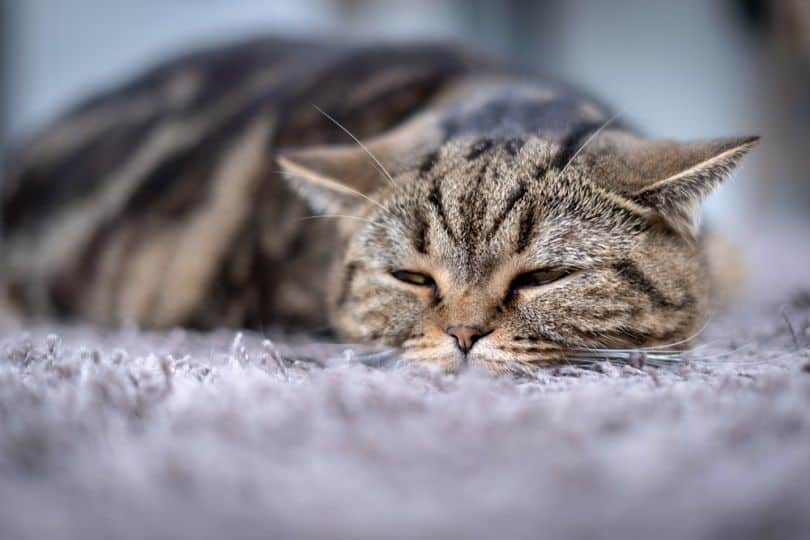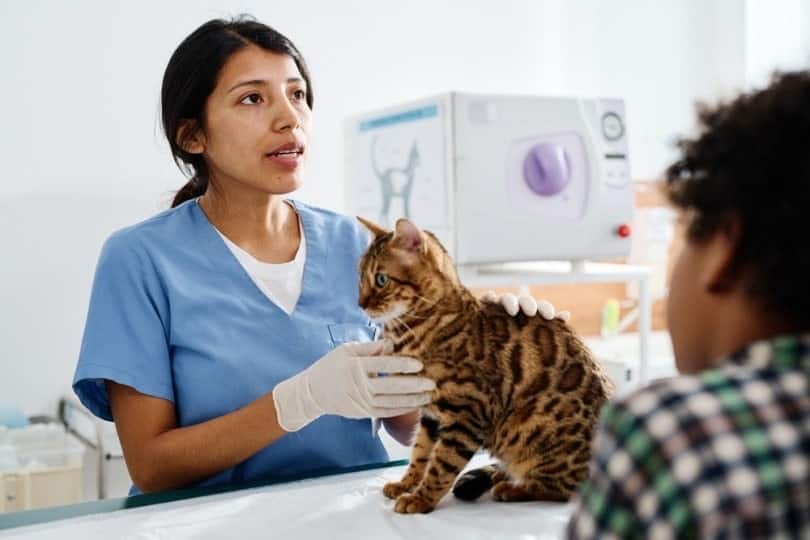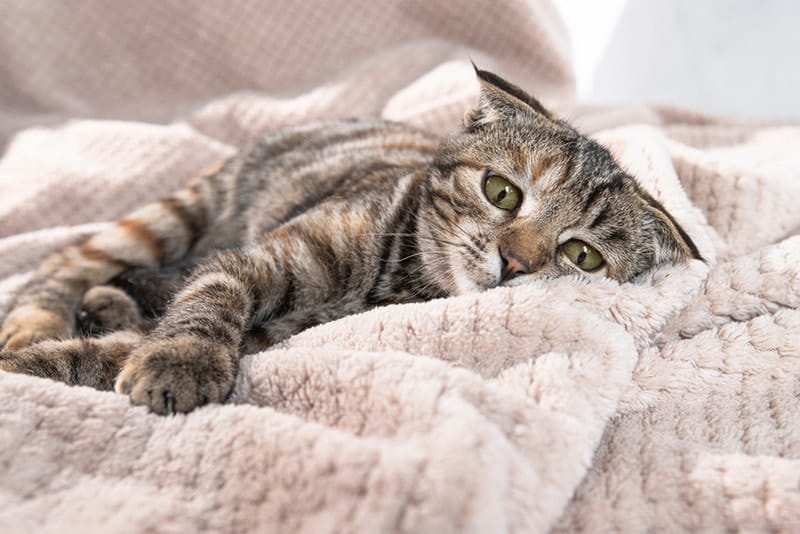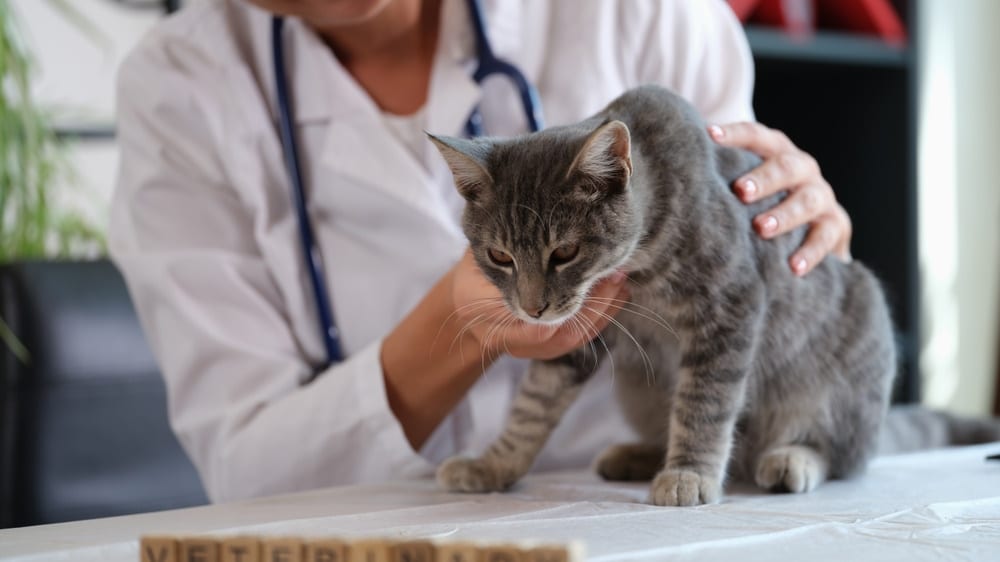It’s comprehensible to feel anxious in case your once food-loving feline has a reduced appetite recently but still acts normal. Although cats might be finicky about mealtimes and their food preferences, a poor appetite could indicate that something is incorrect. There are numerous the explanation why your cat may very well be eating less food than usual but still acting normal.
Not all cats clearly show their discomfort from illnesses or stress, which is why cat parents are encouraged to watch any changes of their cats’ behaviors. Changes in your cat’s eating habits mustn’t be missed, as there is perhaps an underlying issue that needs addressing.
This text will discuss the seven likely issues behind your cat’s reduced appetite and otherwise normal behavior.

The 7 Reasons Your Cat Isn’t Eating But Acting Normal
1. Stress
Identical to humans, cats might be victims of stress too. Nevertheless, the reasoning behind our stress versus our cats is different. Relatively than stressing about work or money worries, cats can change into stressed from things like a brand new pet or baby of their home or other environmental disruptions. Cats don’t handle stress well, so that you will start seeing changes of their behavior.
A decreased appetite is a typical sign your cat may very well be feeling stressed or generally feels unwell. Other signs that would indicate your cat is stressed are changes of their litterbox or sleeping habits.
 Image credit: one photo, Shutterstock
Image credit: one photo, Shutterstock
2. Age
As cats begin to age into their senior years, you may notice their appetite starts decreasing. They might otherwise act normal, but you may notice subtle changes of their activity levels. It will possibly be normal for a cat to eat a bit less the older they get due to reduced activity and a slower metabolism.
In case your cat is eating less food due to their age, the changes can be more subtle than if it were from stress or certain illnesses. Older cats can even experience changes of their food preferences.
Nevertheless, you need to first rule out pain and medical conditions as reasons behind your cat’s poor eating habits. Older cats usually tend to be affected by pain on account of conditions corresponding to arthritis or dental disease, and lots of produce other long run diseases which can suppress their appetite. Senior cats which are refusing to eat any food for twenty-four hours ought to be taken to an emergency veterinarian for a health evaluation.
3. Health Problems
In case your cat is feeling ailing, they might start refusing food or eat lower than usual. This may very well be from pain or nausea that’s making it difficult for them to maintain food down. Various health problems may cause changes to your cats’ eating habits, corresponding to kidney disease and pancreatitis. Anything that causes nasal congestion and affects a cat’s sense of smell can even reduce their appetite. In case you suspect that your cat’s appetite changes are attributable to a health problem, they ought to be taken to a veterinarian.
Cats can hide their health problems well because they are not looking for to indicate that they’re vulnerable. So, in the event that they start refusing food or eating lower than usual, it may possibly be an indication that they usually are not feeling well and you need to get them checked by your vet as soon as possible.
 Image Credit: Pressmaster,Shutterstock-1
Image Credit: Pressmaster,Shutterstock-1
4. Sudden Dietary Changes
Cats might be picky in regards to the food they eat and usually are not keen on dietary changes. If you might have recently switched your cat to a brand new food or modified up their usual food regimen, your cat won’t show much interest in eating it yet.
It will possibly take some time for cats to regulate to the various flavors and textures of the brand new food, and they won’t enjoy it as much as their old food. It is best to step by step introduce latest foods into your cats and permit a transitioning period of seven to 10 days. This can be much easier in your cat’s digestive system and provides them time to regulate to latest foods. This gradual transition period is particularly necessary for felines with sensitive stomachs or picky eating habits.
Unfortunately, some cats struggle to regulate to latest foods in the event that they have a robust preference for his or her old food regimen. Your cat might be not keen on the brand new flavors or prefers either the wet or dry food that they previously ate.
5. Certain Medications
In case your cat is on medication, whether acute or chronic, a decreased appetite may very well be a side effect. Medications corresponding to antibiotics can have uncomfortable side effects like nausea and an upset stomach that could make it difficult to your cat to eat normally. It will be important to talk to your cat’s veterinarian any changes in your cat’s behavior and appetite on their medication.
 Image Credit: Julia-Cherk, Shutterstock
Image Credit: Julia-Cherk, Shutterstock
6. Dental Issues
Dental issues are common in cats and may impact how they eat. Gingivitis, stomatitis, mouth ulcers, periodontal disease, or tooth infections are among the dental issues that may affect cats. It will possibly be painful and difficult for cats to eat their food in the event that they have dental issues.
Not all cats show obvious signs of dental disease until they’re evaluated by a veterinarian, so a decreased appetite is perhaps the primary sign to look out for. In case you suspect that your cat will not be eating much food due to dental issues, you will have to get them checked out by a vet.
Otherwise, some cats won’t eat for just a few hours after getting dental surgery or teeth cleansing. This may very well be from any swelling and discomfort of their mouth that’s making it difficult for them to eat. Your cat’s veterinarian might recommend feeding them wet or soft foods until your cat recovers.
7. Gastrointestinal Problems
Like humans, cats can have gastrointestinal problems like nausea and stomach pain that may affect their appetite. They might have eaten food earlier that didn’t agree with their stomach, or perhaps they’ve acid reflux disorder or irritable bowel disease. This will cause your cat to lose their appetite and never eat much until their gastrointestinal problems ease up.
 Image Credit: megaflopp, Shutterstock
Image Credit: megaflopp, Shutterstock


Conclusion
In case your cat is reluctant to eat their food but still acts normally, don’t hesitate to contact a veterinarian. Cats should never go greater than a few days without eating any food due to risk of hepatic lipidosis (fatty liver disease), a typical explanation for liver failure in cats. It will not be an excellent sign for cats to start out eating less food or refusing food entirely.
Even in case your cat seems otherwise normal, the reduced appetite is an indication that they usually are not. It’s advisable to have them checked out by your vet as soon as possible
Featured Image Credit: 4 PM production, Shutterstock

